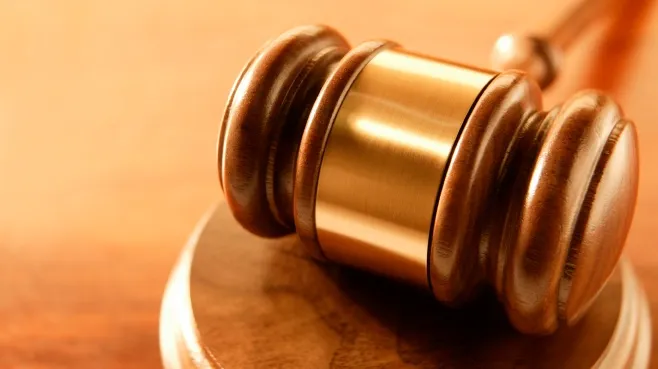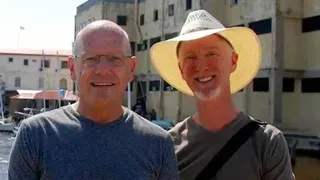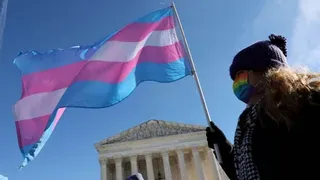August 16, 2014
IGLHRC Brings You The Truth About Uganda and LGBT Strife Around The Globe
Kilian Melloy READ TIME: 7 MIN.
Uganda's horrific Anti-Homosexuality Act (AHA) of 2014 has been struck down on a technicality: Lack of a quorum at its passage. While the news is good, Uganda remains a critical situation receiving the highest level of attention from the International Gay and Lesbian Human Rights Commission (IGLHRC) says Executive Director Jessica Stern.
On the day when the law was struck down, I was at IGLHRC (they pronounce it "Iggle hark")'s Manhattan office to learn about their work. IGLHRC's interventions in Uganda go back to 1999 when leaders there demonized and jailed homosexuals for political gain. That was when IGLHRC brought us the words of Uganda President Museveni who is still in power today: "I have told the CID [Criminal Investigations Department] to look for homosexuals, lock them up, and charge them."
The statement followed false press reports of a marriage ceremony between two gay men in a suburb of Kampala. IGLHRC reminded us that this was not Museveni's first foray into officially sponsored homophobia. In July 1998, he told reporters, "When I was in America some time ago, I saw a rally of 300,000 homosexuals. If you have a rally of 30 homosexuals here, I would disperse it."
In 2004, IGLHRC delivered reports of a dramatic escalation of intimidation, persecution and torture of LGBT activists by the government of Uganda. Throughout the years since, IGHRC continued to partner with Uganda's LGBT activists and brought us the real story of harassment, persecution and the continuous evolution of Ugandan anti-homosexuality laws and punishments.
IGLHRC's presence on the ground in Uganda and its delivery of the facts behind LGBT headlines worldwide have been constant and reliable as it approaches its 25th anniversary.
At the helm, Jessica Stern describes how IGLHRC helps LGBT communities in danger.
"Let's use Africa as the example. African leaders are in Washington D.C. for the first-ever U.S.-Africa Leaders Summit Aug. 4-6, and IGLHRC urges President Obama to guarantee that human rights will be prioritized under any new U.S. economic alliance," she said.
When asked how IGLHRC inserts itself into that meeting/agenda, Stern outlined a nine-part process that typifies IGLHRC's approach.
"We dialogued with the White House about the importance of including LGBT rights in the meeting. We conducted similar discussions with members of the House/Senate. We wrote letters to the President about our concerns for the well-being of LGBT people in Africa. We wrote letters to the US-based multi-national corporations that will participate," she said. "We worked with media to insure that in the reporting no one forgets about the vulnerability of African LGBT people and the importance of including that community in structuring trade/investment relationships. We will have representation at the civil society meetings preceding the summit. We will go back to DC as soon as the summit ends with recommendations for follow-up. We produced a fact sheet explaining why any trade agenda must include LGBT rights. We have been in dialogue with African activists to see what their priorities are."
Her previous work in the fight for women's rights and anti-poverty initiatives shaped her for leadership in LGBT advocacy, but Stern says her influences go back to childhood and South Florida. "I have a very deep connection to Florida because my grandparents spent their winters in Boca Raton. I came to my activism through listening to their stories and learning their experience of being Jewish."
We can thank her grandparents for making Stern such an engaging storyteller. When asked to list some of the IGLHRC accomplishments of which she is most proud, she spoke not only about its ongoing presence in Uganda but spoke also about Iran and the Philippines and St Lucia in the Caribbean.
"In Iran, local media covered LGBT news by using a derogatory word akin to 'faggot.' IGLHRC conducted media training, suggesting better words. Our effort included the launch of a Persian website with key information on sexual orientation and gender identity [iglhrc.org/persian] and the publication of a media sensitivity training manual in Persian on LGBT issues," Stern said. "IGLHRC suggested the proper terminology to refer to the LGBT community, including the words 'Degarbash Jensi,' which literally means 'sexually queer.' In Persian, this term does not have a negative connotation and has been well received by the media and the public. It was wonderful to actually hear those words come out of the mouth of an Iranian newscaster as a result of our work."
IGLHRC's work in the Philippines is a good example of what Stern calls its multi-layered approach.
"We focus on holding governments accountable. Why is that important? If you can't get justice from your own government you have to have someplace to go for it. You know the saying, 'if you are not at the table you are on the table.' We also encourage LGBT people to tell their own stories. Too often, we are maligned with no recourse. When the government of the Philippines came up for review at the UN by the Human Rights Council, we produced a report documenting serious problems, raids on gay bars and extortions. Thirty-eight organizations signed onto that report. Next, we funded activists to go to the UN to testify," she said.
"Then, we did a media blitz about what the UN said and what the Philippines said in response. Their Minister of Justice said 'We want to be a leader in LGBT rights.' We took that statement and ran with it. Today we are part of the team in the Philippines working on a bill prohibiting all forms of discrimination including protections for the LGBT community. It will be a groundbreaking law, basically their 'Civil Rights Act.' Due to pass in 2015, they have been fighting for this bill for fourteen years. The opposition is weaker today, and the LGBT movement is stronger. We have indications that if the bill reaches their president's desk, he will sign it.
"Also in the Philippines, IGLHRC conducted an extensive sensitivity training for the police. During that training, police officers were able to open up for the first time about their own LGBT friends and relatives."
Ging Cristobal, IGLHRC Project Coordinator for Asia and the Pacific Islands Region, describes the concrete and encouraging results of that training.
"A gay man communicated to me that the police in one of the cities where we conducted the workshop were very respectful and professional in addressing his safety and security needs when his brother wanted to physically harm him and he had locked himself inside his room. Also, this man's neighbors would regularly verbally harass and threaten him because of his sexuality. He called the police and they went to his place and told him of his rights and even gave their mobile numbers in case the same incident happens again," he said.
"Just recently, a friend of mine whose appearance shouts 'gay' told me that when he was robbed in one of the streets of Quezon City at around 2 a.m., he was left naked. When the police saw him they immediately asked him to go inside the car, provided clothes for him to wear, respectfully asked questions, then brought him home and told him that their inspector will be calling or visiting him to get his statement. All the time, this friend was waiting for the expected negative remarks, but the police never said anything against his 'gayness.' He was really grateful that despite being robbed, threatened and left naked in the street, he was treated quite humanely by the police."
That successful IGLHRC police training is now being replicated in other parts of the Philippines.
"In the Philippines, IGLHRC was the only organization to partner with the police to confront these issues and gave them the correct information: That LGBT persons are not asking for special privileges or treatment, but just basic respect when police do their work in serving and protecting people," Stern said.
Stern describes IGLHRC's work in the Caribbean.
"The Caribbean is the only region in the western hemisphere that still has sodomy laws on the books, so it merits the attention it gets. There is no doubt that when these laws are on the books, the state is giving its approval of anti-gay governance, but if you are only reading about the violence there, you miss the story of activism," she said. "In Jamaica, local LGBT activists made the anti-gay happenings an issue because they wouldn't take it. We are launching a new partnership with a group in Saint Lucia, involving local LGBT activists from five Caribbean countries. In St Lucia there is an LGBT group called 'United and Strong.' We met them in 2012. Their office was burned down because of their work. At the time, it seemed that on this small island there would be no way to escape persecution. Now, in 2014, we are partnering with them. They have recovered, and are leading the media-sensitivity charge."
With IGLHRC for four years, Stern has many other stories of positive impact for LGBT people whose oppression would have gone unnoticed had IGLHRC not been the eyes, ears and megaphone of the worldwide LGBT community.
"You may be at home in New York City or Fort Lauderdale, trying to understand LGBT headlines from Nairobi or Bangkok or accounts of anti-LGBT violence in Nigeria, Uganda or Russia. Delivering the real picture of LGBT life in those places is one strength of IGLHRC," she said. "We have a staff of twenty, and we have the right partners on the ground reporting the facts of a situation. IGLHRC is the bridge between the grassroots and the treetop. Laws won't change overnight. We have to start by changing hearts and minds, working to train media people about sensitive reporting on LGBT rights, and government about the basic rights of their LGBT communities."
Visit iglhrc.org for more about its four goals of advocating for the elimination of discriminatory policies and practices, such as sodomy laws; supporting the enactment of just laws, policies and practices; striving to reduce family, community and state-sanctioned violence; and actively promoting economic, social and cultural rights in employment, housing, education and health.
Kilian Melloy serves as EDGE Media Network's Associate Arts Editor and Staff Contributor. His professional memberships include the National Lesbian & Gay Journalists Association, the Boston Online Film Critics Association, The Gay and Lesbian Entertainment Critics Association, and the Boston Theater Critics Association's Elliot Norton Awards Committee.




